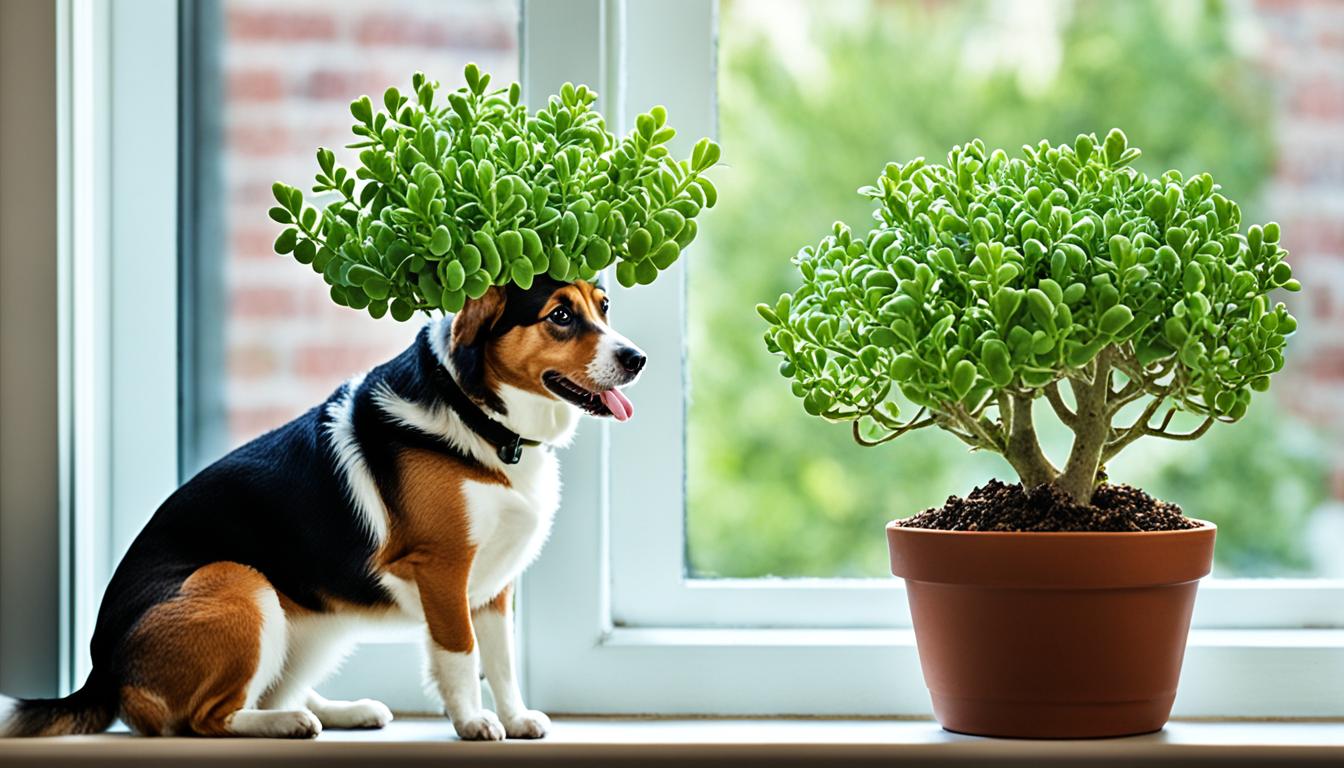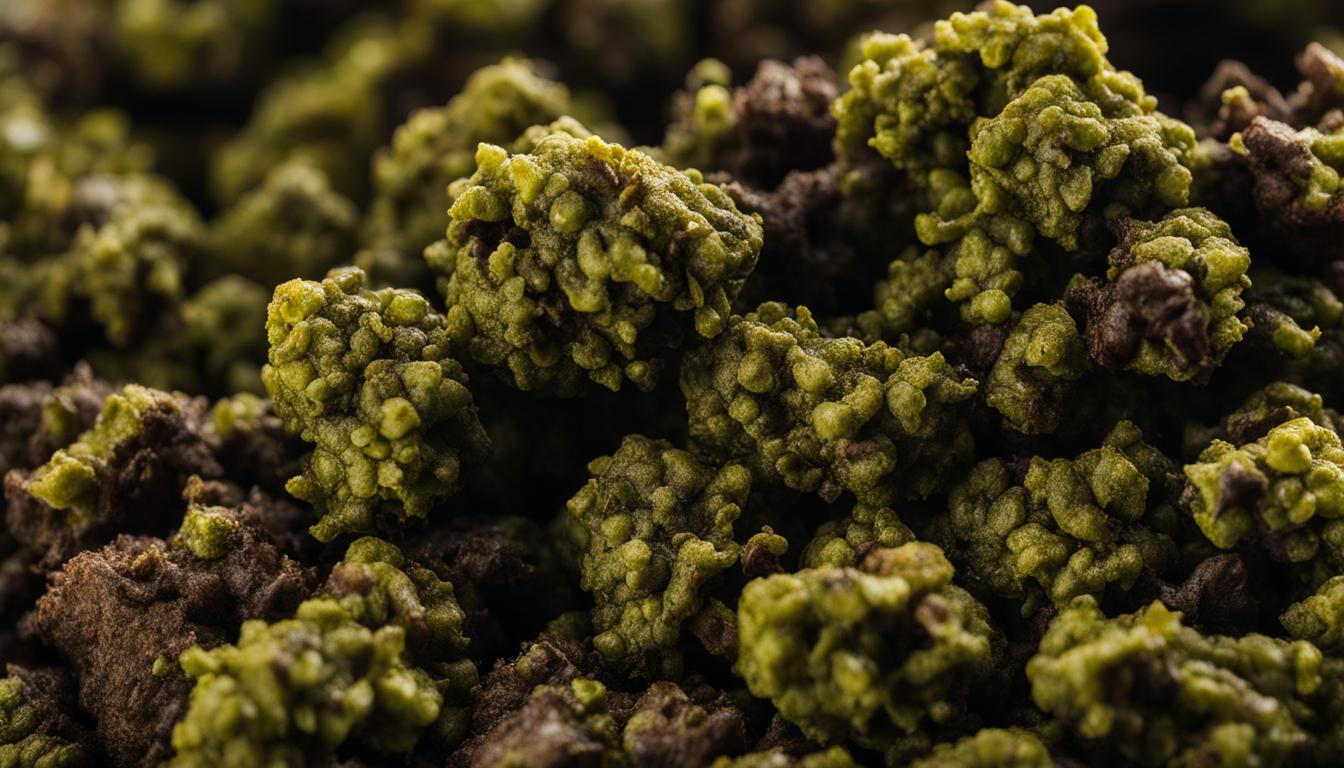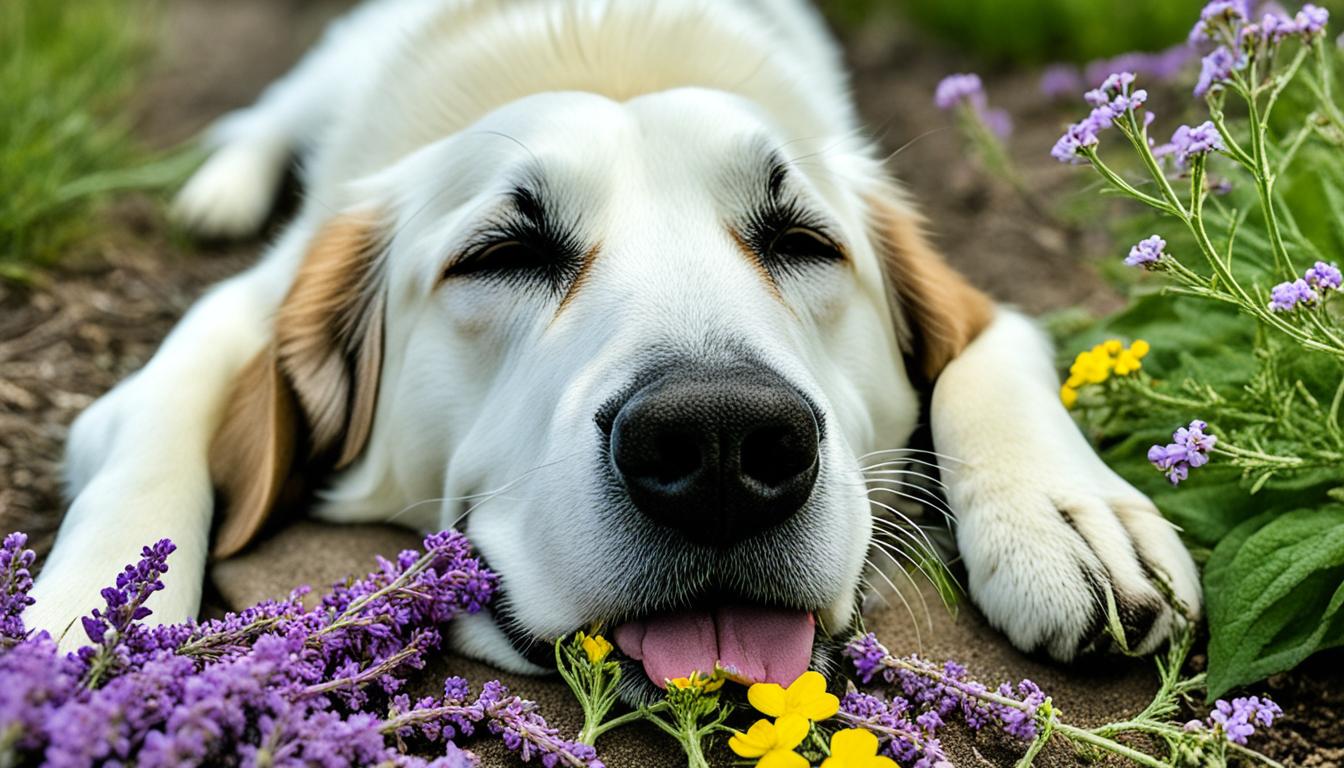If you love both pets and indoor plants, it’s important to know some plants can be harmful. The jade plant is a common indoor plant. You might wonder if it’s safe for dogs. Let’s talk about whether jade plants can make dogs sick. We’ll look at the signs of sickness and how to keep your pets safe.
Key Takeaways:
- Jade plants can be mildly toxic to dogs, but the effects are usually mild and self-resolving.
- Ingestion of jade plants may lead to mild gastrointestinal distress in dogs, such as vomiting and anorexia.
- Veterinary care is generally not required after exposure to jade plants, but it’s best to consult a veterinarian if your dog shows persistent symptoms.
- It’s important to be aware of other toxic houseplants and choose pet-safe alternatives to ensure the well-being of your pets.
- Creating a pet-friendly home involves researching the toxicity of houseplants, keeping toxic plants out of reach, and seeking veterinary care when needed.
Jade Plant Toxicity in Dogs
Pet owners need to know about jade plants and dogs. Eating jade plants can make dogs sick. They may vomit or not want to eat. Sometimes, dogs may feel tired or walk funny. If your dog seems very sick, you should take them to the vet.
Jade plants are not usually too dangerous for dogs. But, watch your dog carefully if they eat any. If your dog acts strangely, talk to a vet. It’s important to keep your pet safe.
“In most cases, the toxicity of jade plants to dogs is considered low, and no specific treatment is needed after exposure.”
Every dog is different when it comes to toxins. Watch closely if your dog eats jade plants. For help, you should see your vet right away.
Pet-Safe Alternatives
Worried about jade plants? There are safe plants for your home. Some good choices are:
- Spider plants
- Boston ferns
- Areca palms
- African violets
These plants are not only pretty. They also make your home safe for dogs.
We must know the dangers and protect our pets. Next, we’ll talk about signs of jade plant poisoning in dogs.
Symptoms of Jade Plant Poisoning
It’s vital to know the signs of jade plant poisoning in dogs. Dogs who eat jade plants may show different signs. These signs depend on how much they ate.
Vomiting is a common sign of jade plant poisoning. If your dog vomits after touching a jade plant, it might be toxic. Anorexia, or not wanting to eat, is another sign.
Jade plant poisoning can make a dog very tired, known as lethargy. Another sign can be a stumbling gait. This means your dog may walk funny or seem off balance.
Each dog may show different signs. How bad these signs are can depend on how much plant they ate. If you think your dog ate a bad plant, always see a vet.
| Symptoms of Jade Plant Poisoning in Dogs |
|---|
| Vomiting |
| Anorexia (loss of appetite) |
| Lethargy (tiredness, weakness) |
| Stumbling gait (difficulty walking, lack of coordination) |
Think your dog ate a jade plant or another bad plant? Getting help from a vet is key. They can check your dog, start the right treatment, and keep an eye on them.
Veterinary Diagnosis and Treatment
If you think your dog ate a jade plant, take them to a vet fast. The vet will check your dog carefully to figure out how to help. They might do tests to see how bad the poison is.
They could test your dog’s pee and poop to find problems. They might also use x-rays or ultrasound to look inside your dog. This helps them see if there’s damage or something stuck. Sometimes, they do an endoscopy. This lets them see inside with a camera on a tube.
Diagnostic Procedures for Jade Plant Toxicity
| Diagnostic Procedure | Description |
|---|---|
| Physical Examination | An overall check-up to find any symptoms or signs of trouble. |
| Urine and Stool Analysis | They take samples to look for weird things caused by the plant. |
| Imaging (X-rays, Ultrasound) | They use special pictures to look at the belly area for issues. |
| Endoscopy | A small camera goes inside to look at the digestive system. |
Vets do careful checks and tests to understand jade plant poison effects. This helps them make a good plan to fix health problems. They give the right treatments to make your dog feel better.
Other Houseplants Toxic to Dogs
Jade plants can be risky for dogs, but they’re not alone. Many houseplants could harm our furry friends. So, it’s key for pet owners to know and stay away from these plants. This helps keep their pets safe and happy.
Here’s a list of some houseplants bad for dogs:
- Aloe Vera
- Asparagus Fern
- Cacti
- Dracaena
- Ivy
- Lilies
- Oleander
- Peace Lilies
- Philodendron
- Rubber Trees
- Snake Plant
- Sago Palm
- ZZ Plant
It’s key to know the danger these plants could be to dogs. While some might only upset their stomachs, others are more dangerous. They could cause serious sickness. As pet owners, we must keep these plants out of our homes. Or, make sure they’re far from our dogs.
We can pick dog-safe plants to make our home look nice. Spider plants, Boston ferns, areca palms, and African violets are safe for dogs. They add beauty without the risk.
To keep your dog safe, watch how they act around plants. Don’t let them chew or eat any plants. If your dog eats a bad plant, or acts sick, see a vet right away. Acting fast is key to keeping them safe.
Symptoms and Treatment for Other Toxic Houseplants
If your dog eats a toxic plant, take them to the vet quickly. They might get sick, with symptoms like upset stomach, mouth pain, and swelling. Vomiting, diarrhea, and drooling can also happen.
Each plant has different symptoms, so know these signs. If your dog acts weird or looks different, see a vet. They can figure out what’s wrong.
For plant poisoning, dogs might need care, medicine, and to be watched closely. What the vet does depends on how bad it is and the plant eaten. Sometimes, they make the dog vomit or give them a special charcoal to help.
Don’t try to fix it yourself. Only a vet should treat a poisoned dog.
To show why vet care is key, here are some plants that are bad for dogs:
| Common Toxic Houseplants | Symptoms | Treatment |
|---|---|---|
| Aloe Vera | Irritation of the mouth and throat, vomiting, diarrhea | Supportive care, fluid therapy |
| Dracaena | Respiratory distress, gastrointestinal upset | Supportive care, symptomatic treatment |
| Lilies | Kidney damage, vomiting, lethargy | Immediate veterinary care, supportive treatment |
If you’re not sure about a plant, better safe and check with a vet or expert.
Preventing Dog Poisoning from Houseplants
To keep your furry friend safe, watch out for dangers at home. Houseplants can be risky for pets if toxic. There are steps to stop dog poisoning from plants.
Choose Pet-Safe Houseplants
Picking pet-safe plants keeps your dog healthy. Choose plants that won’t hurt your pet if eaten. Spider plants, Boston ferns, and African violets are safe choices.
With pet-safe plants, you can have greenery without worrying about your dog.
Keep Toxic Plants Out of Reach
If you have harmful plants, keep them away from your dog. Put them on high shelves or in hanging planters. This stops your dog from eating them and prevents poisoning.
Know which plants are bad for your dog. Remove any dangerous ones. It’s best to be careful for their safety.
Monitor Your Dog’s Behavior
Watch how your dog acts around plants. Some dogs might chew on them. If your dog tries to eat plants, stop them.
Give them chew toys and other fun things to do. This keeps them away from plants and stops accidents.
“By selecting pet-safe houseplants and keeping toxic plants out of reach, you can create a safe and enjoyable environment for both you and your furry friend.”
Make sure your dog is safe with houseplants around. By taking these steps, your home will be safe for pets. It will be free from the dangers of toxic plants.
| Pet-Safe Houseplants | Toxic Plants |
|---|---|
| Spider plants | Aloe vera |
| Boston ferns | Asparagus fern |
| African violets | Cacti |
Importance of Veterinary Consultation
If you suspect your dog ate something harmful, like a jade plant, it’s crucial to see a vet. Even mild symptoms need attention for your pet’s health.
Your vet will check your dog and figure out what they need. They know how to spot and treat poisoning.
Remember, your furry friend’s health should never be taken lightly.
“Consulting with a veterinarian is always recommended whenever you have concerns about your pet’s well-being. They have the knowledge and experience to provide appropriate guidance and care.”
If your dog ate a jade plant or a similar danger, tell your vet. They’ll help with tests and keep an eye on recovery. A vet visit is key for the right care and treatment.
Always prioritize the well-being and safety of your furry companion.
Pet-Safe Alternatives to Jade Plants
If you want to add plants to your home without risking your pet’s safety, good options exist. These include dog-friendly plants that make your home look great and keep pets safe.
1. Spider Plants
The spider plant is a great choice that’s safe for pets and cleans the air. Its long leaves bring elegance to any room.
2. Boston Ferns
Boston ferns are lush and perfect for warm, moist areas like bathrooms or kitchens. They are safe for pets and bring a lively green touch.
3. Areca Palms
The areca palm is a tall, pet-safe plant that brings a tropical vibe. It does well in bright rooms and looks stunning in living areas or offices.
4. African Violets
African violets add color with their soft, colorful flowers. They are pet-safe and perfect for bright spots in your home.
While these plants are safe, pets might still try to play with them. It’s important to watch how your pet acts around them.
With pet-friendly plants like these, you can have plants indoors without worrying about your pet. They keep your home looking beautiful and your pet safe.
Raising Awareness about Pet Safety with Plants
Houseplants are more popular now. But some can be bad for pets. Pets might get sick from plants like jade plants. We must teach pet owners which plants are safe. This helps keep dogs away from danger. It keeps them healthy and safe.
The Importance of Pet Safety
Pets love to explore, especially dogs. They might chew on houseplants. But some plants, like jade ones, are not safe. These plants can make dogs sick.
Pet owners need to make their homes safe for pets. This includes being careful with houseplants.
Understanding Jade Plant Toxicity
Jade plants are Crassula ovata. They have bufadienolides that are bad for dogs. If a dog eats this plant, it can have stomach problems. This can cause vomiting and diarrhea.
If your dog eats a jade plant, see a vet right away. They can help your dog.
Promoting Pet-Safe Alternatives
We can keep pets safe by choosing the right plants. There are many beautiful plants that are okay for dogs. For example, spider plants and Boston ferns are good. Areca palms and African violets are safe too.
This way, pet owners can relax. Their dogs will be safe at home.
Spreading the Word
We need to tell people how to keep pets safe around plants. We can use social media and pet groups to share tips. This helps more people learn how to protect their pets.
“Keeping pets safe is something we should all do. We need to tell others about dangerous plants. And we should share safe plant ideas too. This will help keep pets happy and healthy.” – Dr. Sarah Thompson, DVM
Together, we can make a place where pets are always safe and happy.
Taking Precautions for Pet-Friendly Homes
Creating a safe home for pets needs careful steps. By taking simple actions, you can make a secure place for them.
Researching the Toxicity of Houseplants
Learn about the plants you own or want to get. Know which ones could harm your pets. This helps you pick safe plants for your home.
Keeping Toxic Plants out of Reach
Keep harmful plants away from pets. Put them high up or in pet-free rooms. This reduces the risk of accidents with plants.
Providing Alternative Safe Options
Give your pets safe plants to check out. Spider plants and Boston ferns are good. Place them where your pets can safely explore them.
Monitoring Your Pets’ Behavior and Seeking Veterinary Care
Watch how your pets act around plants. If they seem too interested, distract them. If they eat a bad plant, get vet help right away. Quick action is key.
Remember, pet safety at home is important. Learn about plant dangers, keep bad plants away, offer safe ones, and watch your pets. This will keep them happy and healthy.
Conclusion
Jade plants can be a little toxic to dogs. This poses a risk to their health. But, the symptoms are usually mild and go away on their own.
If your dog eats a jade plant, seek vet care quickly. It’s important for a right diagnosis and treatment.
Knowing the dangers of jade plants helps keep pets safe. Keep these plants away from pets. Choose safe plants and watch how your pets act around them.
Quick action and talking to a vet can keep your dog safe. With care, you can enjoy plants without worry. This makes a safe home for your pet.







